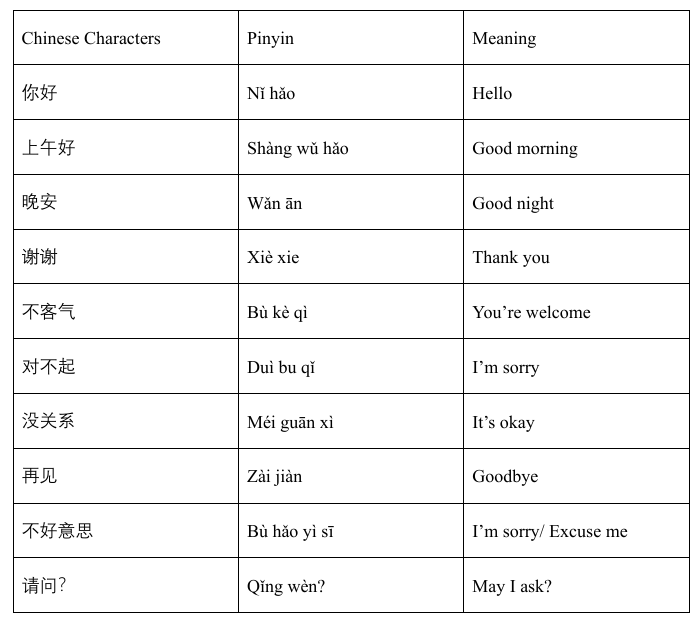A Quick Gance
Click to listen to their pronunciation:

Explanation For Each Phrase
1. 你好 (Nǐ hǎo)
This foundational greeting means “Hello.” Using “你好” is polite and inviting, perfect for starting conversations. For instance, greeting a shopkeeper with “你好” sets a friendly tone for your shopping experience.
This phrase is common and somewhat formal, especially for first meetings with strangers. For friends, you can use 嗨 (Hāi), which comes from the English ‘Hi.’ It’s perfect for close friends or casual settings.
2. 上午好 (Shàng wǔ hǎo)
- 上午好 specifically means “Good morning”.
- Similarly, you can use 中午好 (Zhōng wǔ hǎo) for “Good noon,” 下午好 (Xià wǔ hǎo) for “Good afternoon,” and 晚上好 (Wǎn shàng hǎo) for “Good evening.
3. 晚安 (Wǎn ān)
- This phrase is used at night or before bed to wish others a restful sleep. It’s great for ending a call with loved ones or saying goodbye after a late meeting.
- However, keep in mind that some people consider it a more intimate expression.
4. 谢谢 (Xiè xie)
To express gratitude, use “谢谢.” Whether someone holds the door for you or brings your meal, saying “谢谢” shows appreciation and good manners.
- For instance, if you receive a complimentary cup of tea from a host during a visit, saying “谢谢” promptly shows your appreciation and good manners.
5. 不客气 (Bù kè qì)
This means “You’re welcome” and is the appropriate response to “谢谢.” It helps maintain a friendly rapport after an act of kindness.
For example, in a restaurant, when a customer thanks the waiter for bringing the food, the waiter can reply ‘不客气’ to maintain a friendly rapport.
6. 对不起 (Duì bu qǐ)
- Use “对不起” to apologize for mistakes or inconveniences.
- If you accidentally step on someone’s foot, quickly saying “对不起” shows that you’re aware of your mistake and are asking for forgiveness.
7. 没关系 (Méi guān xì)
This phrase means “It’s okay” and is a response to “对不起,” easing any tension and reassuring the person that all is well.
8. 再见 (Zài jiàn)
- Simply meaning “Goodbye” or “See you next time.”
- It’s suitable for any parting moment, whether you’re leaving a classroom or saying goodbye after a casual chat with friends.
9. 不好意思 (Bù hǎo yì sī)
- This expression serves a dual purpose. In the context of an apology, “不好意思” means ‘I’m sorry’ and is a softer way to express regret compared to “对不起.” It’s often used for minor mistakes, small inconveniences, or social slip-ups.
- Additionally, ‘不好意思’ can be used as a polite way to preface a question, similar to saying ‘Excuse me’ in English. For example, if you want to ask a stranger for directions, you can say, ‘不好意思,请问地铁站在哪里?’, which means, ‘Excuse me, could you tell me where the subway station is?’
10. 请问? (Qǐng wèn?)
- This phrase is used to politely get someone’s attention before asking a question, seeking directions, or gathering information.
- For instance, at a tourist center, you might say, “请问, 去故宫博物院怎么走?” (May I ask how to get to the Palace Museum?).
Other Learning Resources
This video introduces some polite words and greetings in Mandarin that are covered in this post:
This is a polite Chinese expression song: